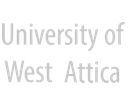Library anxiety among undergraduate students in Greece
Abstract
Keywords
References
Anwar, M.A., Al-Kandari, N.M., & Al-Qallaf, C.L. (2004). Use of Bostick's library anxiety scale on undergraduate biological sciences students of Kuwait University. Library & Information Science Research, 26, 266-283.
Bostick, S.L. (1992). The development and validation of the library anxiety scale. PhD Thesis, Wayne State University.
Carlile, H. (2007). The implications of library anxiety for academic reference services: a review of literature. Australian Academic & Research Libraries, 38, 129-147.
Chatzilia, M. and Sylaiou, S. (2013). Assessing information literacy skills among undergraduate students at the Alexander Technological Educational Institute of Thessaloniki. In Worldwide Commonalities and Challenges in Information Literacy Research and Practice. Springer International Publishing, pp. 450 - 457.
Colón-Aguirre, M. and Fleming-May, R.A. (2012). “You just type in what you are looking for”: Undergraduates' use of library resources vs. Wikipedia. The Journal of Academic Librarianship, 38, 391-399.
De Jager, K. (2002). Impacts and outcomes: searching for the most elusive indicators of academic library performance. Meaningful measures for emerging realities. Proceedings of the 4th Northumbria International Conference on Performance Measurement in Libraries and Information Services 2001, Association of Research Libraries, Washington, DC, pp. 291-297.
Doris, K.A., Provata, P.A. and Vraimaki, E. (2015). Assessing library anxiety in undergraduate students using the Greek Library Anxiety Scale (G-LAS). Proceedings of the 5th International Conference on Integrated Information, September 21-24, Mykonos, Greece (In press).
Erfanmanesh, M. (2011). Use of multidimensional library anxiety scale on education and psychology students in Iran. Library Philosophy and Practice (e-journal), Paper 563. Available at: http://digitalcommons.unl.edu/libphilprac/563
Goodall, D. and Pattern, D. (2011). Academic library non/low use and undergraduate student achievement: a preliminary report of research in progress. Library Management, 32, 159 - 170.
Griffiths, J.R. and Brophy, P. (2005). Student searching behavior and the Web: Use of academic resources and Google. Library Trends, 53, 539-554.
Jacobson, F.F. (1991). Gender differences in attitudes toward using computers in libraries: An exploratory study. Library & Information Science Research, 13, 267-279.
Jerabek, J.A., Meyer, L.S. and Kordinak, S.T. (2001). “Library anxiety” and “computer anxiety:” Measures, validity, and research implications. Library & Information Science Research, 23, 277 - 289.
Jiao, Q.G. and Onwuegbuzie, A.J. (1997). Antecedents of library anxiety. The Library Quarterly, 64, 372 - 389.
Jiao, Q.G. and Onwuegbuzie, A.J. (1999). Is library anxiety important?. Library Review, 48, 278 - 282.
Jiao, Q.G. and Onwuegbuzie, A.J. (2001). Library anxiety and characteristic strengths and weaknesses of graduate students' study habits. Library Review, 50, 73 - 80.
Jiao, Q.G., Onwuegbuzie, A.J. and Lichtenstein, A.A. (1996). Library anxiety: characteristics of ‘at-risk’ college students. Library & Information Science Research, 18, 151 - 163.
Korobili, S. and Tilikidou, I. (2005). The necessity of information literacy education in a marketing department. New Library World, 106, 519 - 531.
Kracker, J. (2002). Research anxiety and students' perceptions of research: an experiment. Part I. Effect of teaching Kuhlthau's ISP model. Journal of the American Society for Information Science and Technology, 53, 282 - 294.
Martin, J. (2008). The information seeking behavior of undergraduate education majors: does library instruction play a role?. Evidence Based Library and Information Practice, 3, 4 - 17.
Maughan, P.D. (2001). Assessing information literacy among undergraduates: a discussion of the literature and the University of California-Berkeley assessment experience. College & Research Libraries, 62, 71 - 85.
Mech, T.F. and Brooks, C.I. (1995). Library anxiety among college students: An exploratory study. In 7th National Conference of the Association of College and Research Libraries, Pittsburgh, PA (Vol. 30).
Mellon, C.A. (1986). Library anxiety: a grounded theory and its development. College & Research Libraries, 47, 160 – 165. Omran, A.I.B. (2001). Library anxiety and internet anxiety among graduate students of a major research university. Unpublished Doctoral Thesis, University of Pittsburgh
Onwuegbuzie, A.J. and Jiao, Q.G. (1998a). The relationship between library anxiety and learning styles among graduate students: Implications for library instruction. Library & Information Science Research, 20, 235 – 249.
Onwuegbuzie, A.J. and Jiao, Q.G. (1998b). Understanding library-anxious graduate students. Library Review, 47, 217 – 224.
Onwuegbuzie, A. J. and Jiao, Q.G. (2000). I’ll go to the library later: the relationship between academic procrastination and library anxiety. College & Research Libraries, 61, 45 - 54.
Onwuegbuzie, A.J. and Jiao, Q. G. (2004). Information search performance and research achievement: an empirical test of the Anxiety-Expectation Mediation model of library anxiety. Journal of the American Society for Information Science and Technology, 55, 41 – 54.
Onwuegbuzie, A.J., Jiao, Q.G. and Bostick, S.L. (2004). Library anxiety: Theory, research, and applications. Lanham, Massachusetts and Oxford: The Scarecrow Press.
Shoham, S. and Mizrachi, D. (2001). Library anxiety among undergraduates: A study of Israeli B.Ed students. The Journal of Academic Librarianship, 27, 305-311.
Skowronek, D. and Duerr, L. (2009). The convenience of nonprobability survey strategies for small academic libraries. College & Research Libraries News, 70, 412 – 415.
Song, Z., Zhang, S. and Clarke, C.P. (2014). Library anxiety among Chinese students: Modification and application of LAS in the context of Chinese academic libraries. The Journal of Academic Librarianship, 40, 55 – 61.
Wigo, M. (2011). Library anxiety among Polish students: development and validation of the Polish Library Anxiety Scale. Library & Information Science Research, 33, 144 – 150.
van Kampen, D.J. (2004). Development and validation of the multidimensional library anxiety scale. College & Research Libraries, 65, 28-34.
Veal, R. (2002). The relationship between library anxiety and off campus adult learners. Journal of Library Administration, 37, 529 – 536.
DOI: 10.18780/jiim.v2i2.3065
Refbacks
- There are currently no refbacks.






